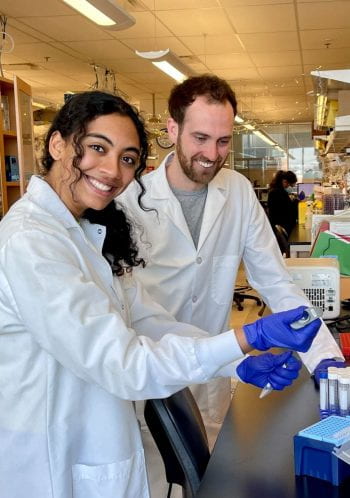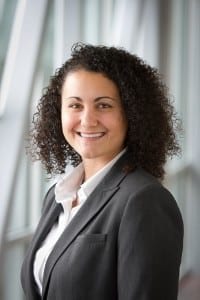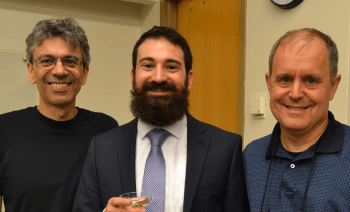The lab congratulates our newest postdoc, Dr. James O’Connor, on winning the Genetics Society of America’s Larry Sandler award. The award honors the best PhD thesis work in the field of Drosophila research from the previous year. James will be presenting his thesis work as the Larry Sandler Memorial lecture at the upcoming Drosophila Research […]
Author: sylvia_j
Aaron wins Neuroscience Community Award for Excellence in Mentoring
Dr. DiAntonio was honored to be recognized for Excellence in Mentoring in the second annual Neuroscience Community Awards. This wasn’t his first award for mentorship. He has also won the Outstanding Faculty Mentor Awards from both the Graduate Student Senate (2011) and the Postdoctoral Society (2008).
Key finding supporting role of STMN2 in ALS
Stathmin-2 (STMN2) is a target of the ALS-protein TDP-43 suggesting that loss of STMN2 due to TDP-43 pathology could contribute to the development of ALS. However, no studies in animals had tested the function of STMN2. Kelsey Krus, an MD/PhD student in the lab, made a STMN2 mouse model and discovered that even modest reductions in STMN2 […]
Neha Damaraju Wins a Goldwater Scholarship

Congratulations to Neha Damaraju on winning the prestigious Goldwater Scholarship! She is pictured here with two of her mentors, Mark Zaydman and James Weagley. Her project explores the role of the newly discovered TIR family of NAD+ cleaving enzymes in bacterial immunity.
Activating Mutations of Sarm1 Enriched in ALS
Sarm1 mutations are not common in ALS patients, but a careful examination of the ones that do occur by Dr. Joseph Bloom and colleagues has shown that they tend to cause Sarm1 to be constitutively active and occur more frequently in ALS patients than in the general population. This research, published in Molecular Neurodegeneration, suggests […]
Discovery of SARM1 Activation by Allosteric Metabolite Sensing Described in New Neuron Paper
SARM1 is the key executioner enzyme for axon degeneration. In a healthy neuron, SARM1 exists in an enzymatically “off” state. Axon injury turns on SARM1’s activity to hydrolyze the important metabolite NAD+, leading to metabolic crisis and axon fragmentation. The mechanism underlying SARM1 activation by axon injury was discovered in a recent study from the […]
New PNAS Paper Examines Mechanism of Sarm1 Autoinhibition
Axons contain a protein, Sarm1, capable of triggering their self-destruction. It is crucial that such a protein be kept in an ‘off’ state or neurodegeneration will occur. In the current paper from the DiAntonio and Milbrandt labs at Washington University and the Hao Wu lab at Harvard University, Multiple domain interfaces mediate SARM1 autoinhibition, they […]
Aaron named fellow of the American Academy for the Advancement of Science
Dr. Aaron DiAntonio is being honored with fellowship in the American Academy for the Advancement of Science (AAAS) for his contributions to neuroscience, in particular to understanding pathways of injury response and degeneration in axons. Dr. DiAntonio is one of seven Washington University faculty named to the AAAS. Look for the formal announcement of the […]
Margaret wins the Rita Levi-Montalcini Award for Best Student Presentation
Congratulations to Margaret Hayne for winning the Rita Levi-Montalcini Award for Best Student Presentation at the joint Developmental Biology/Developmental, Regenerative and Stem Cell Biology Virtual Retreat!
Eli Lilly Buys Company Cofounded by Dr. DiAntonio and Dr. Milbrandt
In a move that we hope will lead to faster development of therapies targeting Sarm1 in neurodegenerative diseases, Eli Lilly bought Disarm Therapeutics, the company cofounded by Aaron and Jeff. The Source has a nice write-up covering the Disarm’s founding and acquisition.
Erin Frey Now Sr. Project Manager at Serepta
In July, Dr. Frey joined Serepta Therapeurtics as Senior Manager, Project Management Gene Therapy Research.
Lab Alumna Wins Best Talk Prize
We would like to wish Lauren Walker, a former graduate student in the lab, a hearty congratulations for winning the best talk prize at the Hilde Mangold Postdoctoral Symposium at the recent Society for Developmental Biology meeting. She won the award for her presentation on “Identification of extrinsic cues promoting target-selective axon regeneration”.
Lab in the Time of Covid-19
In March, like many labs across the country, we reduced activity in the lab to a bare minimum in order to protect our members and the larger community. We rapidly accustomed ourselves to lab meetings held via Zoom. Intrepid graduate student Mikolaj Kozlowski pioneered the virtual rotation, later joining the lab. Postdoc Kwang Woo Ko […]
Examining the Role of SARM1 in a Mouse Model of Glaucoma
A recent JCB paper from postdoc Kwang Woo Ko looks at Sarm1’s role in glaucoma. He shows that knocking out Sarm1 protects retinal ganglion cells and axons in a mouse model of glaucoma. His experiments demonstrate that neuroinflammatory and necroptotic signaling work through SARM1 to drive axon loss.
Hailun “Helen” Li Presents Thesis Work on Regulation of Potassium Homeostasis by Glia
Hailun “Helen” Li successfully defended her thesis work with a polished presentation via Zoom on April 9th, the first ever virtual thesis defense in the lab. Her work has opened up a new area of interest for the lab, looking at the roles of Sik3 and HDAC4 in regulation of potassium levels in the nerve […]
2019’s New Lab Members

We are extremely pleased to have several new members in 2019. John Palucki joined the lab as a research technician and is helping with many of the tissue culture experiments. Kelsey Krus and Jayson Cruz are both neuroscience graduate students in WUSM’s Medical Scientist Training Program. We are also pleased to welcome Dr. Laura Devault, […]
Thomas Schwarz Keynotes Symposium to Launch New Center
Dr. Aaron DiAntonio and Dr. Jeffrey Milbrandt, co-directors of the Needleman Center for Axonal Therapeutics and Neurometabolism, launched the new center with a symposium featuring Aaron’s PhD mentor, Dr. Thomas Schwarz. Dr. Schwarz, who is now a professor at Harvard, gave a talk titled “Moving and Removing Neuronal Mitochondria”. Other speakers included Dr. Ghazal Ashrafi, […]
Mechanistically Distinct Chemotherapeutics Cause CIPN via Sarm1
Previous work by Dr. Stefanie Geisler had shown that axonal damage subsequent to administration of vincristine, a common chemotherapeutic, was a result of a Sarm1-dependent mechanism. In the recent JCI Insight paper titled “Vincristine and bortezomib use distinct upstream mechanisms to activate a common SARM1-dependent axon degeneration program,” Dr. Geisler and colleagues demonstrated that Bortezomib, […]
DLK responsible for many Fragile X phenotypes in a fly model
Exciting new research from Alex Russo is presented this month in Cell Reports in a paper titled Wnd/DLK Is a Critical Target of FMRP Responsible for Neurodevelopmental and Behavior Defects in the Drosophila Model of Fragile X Syndrome. FMRP1 is the gene mutated in Fragile-X syndrome. It functions as a translational repressor that targets many mRNAs. When […]
A Big Picture Review of Recent Developments
Aaron’s recent review in the journal PAIN synthesizes recent developments in our understanding of axon degeneration and discusses the therapeutic implications. This review also includes an audio recording of him describing the research progress. One of the key discoveries discussed is that Sarm1 is itself an NADase enzyme. Understanding that opens up new possibilities for pharmacological […]
Modeling Neurological Disorders Using Stem Cell-based Approaches
On April 22, Dr. DiAntonio will kick off the Hope Center’s upcoming seminar series, Modeling Neurological Disorders Using Stem Cell-based Approaches. His talk is titled “Axon Degeneration: Mechanistic Insights Yield New Therapeutic Strategies for Neurodegenerative Diseases” and will be at noon in Holden Auditorium.
Alex Russo presents thesis work

Alex will share her thesis work March 27, 2019 in a presentation titled “Neuronal stress pathways influence synaptic development and nervous system function in Drosophila melanogaster”. The seminar will be at 2pm in Holden Auditorium.
Foundation for Peripheral Neuropathy review of Geisler’s study
Read the review of Dr. Stefanie Geisler’s recent study in mice of preventing peripheral neuropathy with gene therapy. The article can be found here: https://www.foundationforpn.org/2019/01/22/gene-therapy-blocks-peripheral-nerve-damage-in-mice/
Susan Culican, New Associate Dean of Graduate Medical Education
Dr. Susan Culican, a former clinical research fellow in the lab, has accepted a new position as Associated Dean of Graduate Medical Education at the University of Minnesota. Our congratulations and best wishes to her in this new endeavor.
Read about Highwire’s interaction with dNMNAT in EMBO Reports
New work from Alex Russo and others looking at the axon protective effects of Highwire’s interaction with dNMNAT will be published soon in EMBO Reports.
Gene therapy for peripheral neuropathy successful in mice
A new paper in the Journal of Experimental Medicine details the experiments led by Dr. Stefanie Geisler in collaboration with the Milbrandt and DiAntonio labs to target SARM1 using gene therapy in mice. This is an exciting step towards possible treatments for peripheral neuropathy and other disorders involving axon breakdown.
Aaron at ASCB
Aaron DiAntonio will be co-chairing the Neural Development and Neurodegeneration Symposium at the American Society for Cell Biology Meeting in San Diego, CA on December 10th, 2018.
Featured Finding! E-Neuro reviews our TRPV1 paper
We are pleased to have our recent paper looking at the role of TRPV1 in preconditioning the regeneration of DRG neurons reviewed as a “Featured Finding” by eNeuro.
Read all about it — Hsp90’s role in axon injury signalling
Scott Karney-Grobe thesis work has been published in the PNAS paper, HSP90 is a chaperone for DLK and is required for axon injury signaling. This is an intriguing new role for Hsp90.
Congratulations to Helen Li on winning the Thach Award!

Hailun “Helen” Li has won the Thach Award for her short talk at the Annual Neuroscience Retreat. No one in the lab was surprised as even Helen’s lab meeting presentations are works of art, but we are especially happy as this is the second year in a row that a member of the lab has won. […]
New paper in PNAS
We are proud to announce that Dan Summers, a postdoc with a joint appointment in the DiAntonio and Milbrandt labs, has a new paper in the Proceedings of the National Academy of Sciences journal titled Palmitoylation enables MAPK-dependent proteostasis of axon survival factors.
People of the lab circa 2002

A look back at the lab folks circa 2002.
Erin Frey joins Folio Conversant as Project Manager

After a successful postdoc culminating with the publication of her eNeuro paper, TRPV1 Agonist, Capsaicin, Induces Axon Outgrowth after Injury via Ca2+/PKA Signaling, Dr. Frey accepted a Project Manager position at Folio Conversant, a contract research company in her hometown of Columbus, Ohio. This move gets two thumbs up from Erin. We’ll all miss her and wish […]
Scott defends his thesis!

Congratulations to Dr. Scott Karney-Grobe who successfully defended his thesis! His work looked at the role of the chaperone protein Hsp90 in neural regeneration. We decided his celebratory cake needed a chaperone, too.